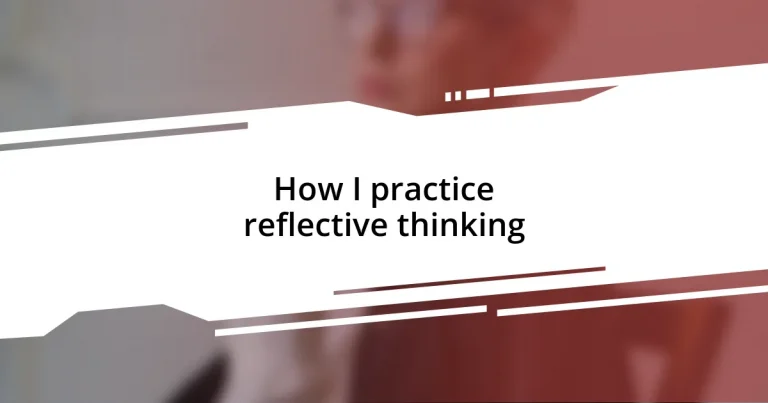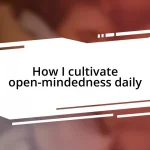Key takeaways:
- Reflective thinking enhances self-awareness and emotional intelligence, fostering personal and professional growth.
- Techniques for practicing reflective thinking include journaling, structured conversations with mentors, and mindfulness meditation.
- Group reflection facilitates deeper insights and strengthens team relationships, promoting a supportive environment for feedback and growth.
- Overcoming challenges in reflective thinking involves embracing discomfort, maintaining consistency, and overcoming fear of judgment.
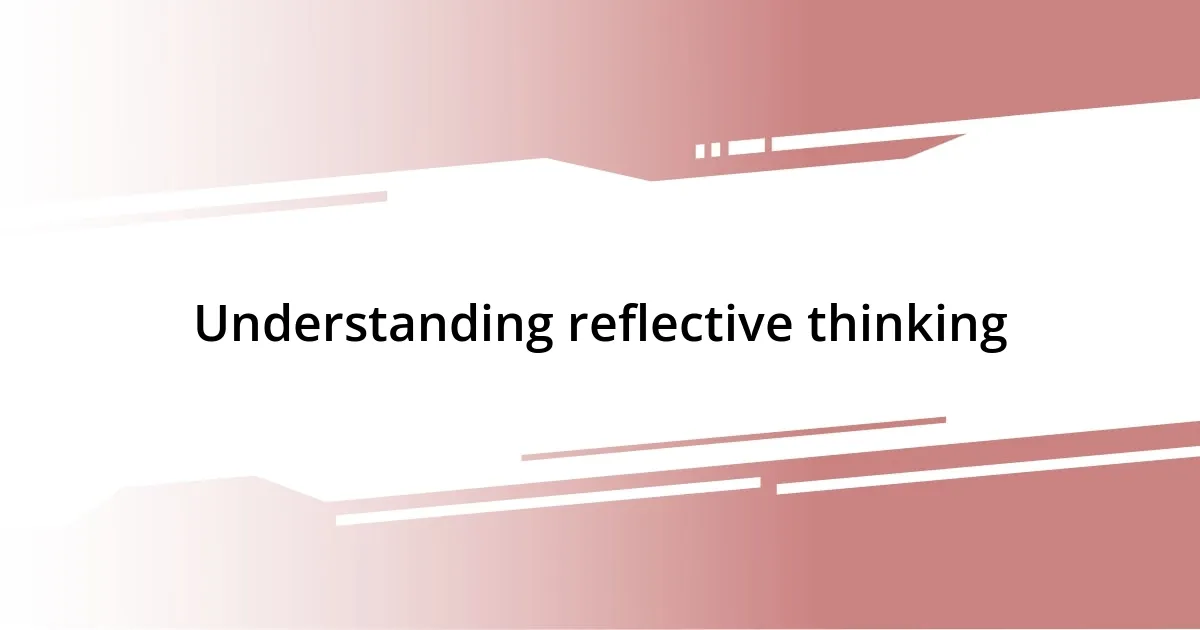
Understanding reflective thinking
Reflective thinking is an intentional process where we examine our thoughts, feelings, and actions, seeking insights from our experiences. I remember a time when I finished a challenging project, and instead of immediately jumping to the next task, I took a moment to reflect on what went well and what didn’t. This pause allowed me to understand not just the outcomes but also my emotions during the process.
Have you ever felt stuck in your thoughts, unsure why an experience impacted you so much? Reflective thinking helps untangle those feelings. For instance, after a particularly frustrating meeting, I took some quiet time to analyze why it unsettled me. This self-inquiry revealed a deeper fear of inadequacy that I didn’t even realize I was feeling—one that stemmed from past experiences.
In essence, understanding reflective thinking involves acknowledging that it’s a journey. Each reflection is like a stepping stone on a path to greater self-awareness. I’ve found that by committing to this practice, I not only grow professionally but also develop a deeper understanding of who I am. Isn’t that a powerful realization?
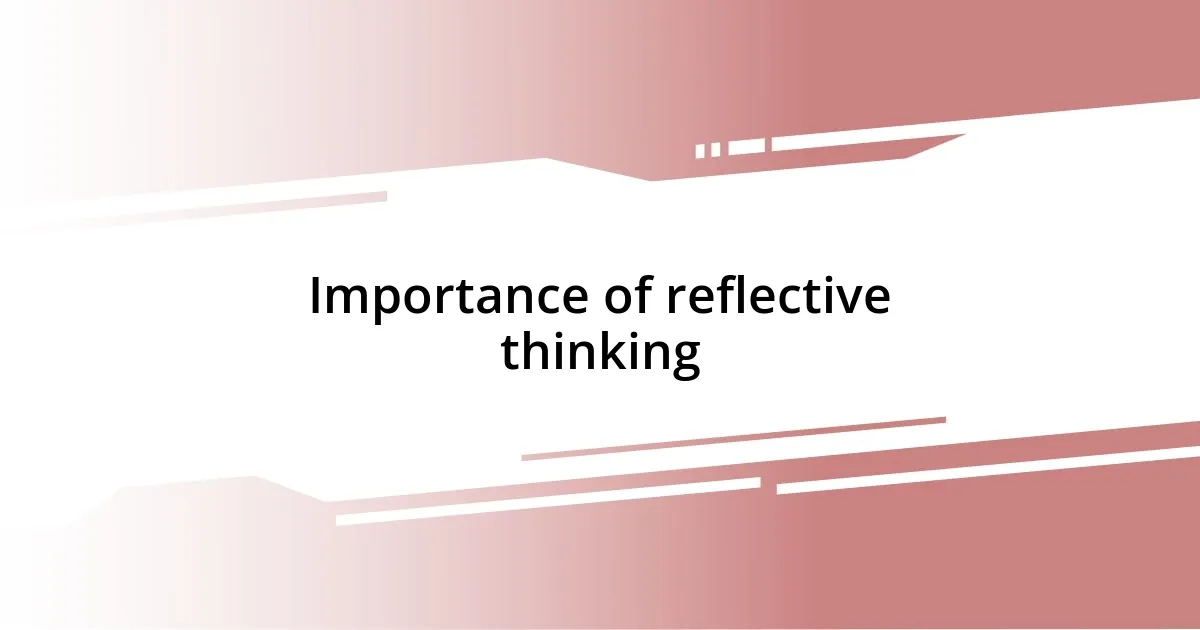
Importance of reflective thinking
Reflective thinking holds immense value in our day-to-day lives, helping us navigate our emotions and decisions with greater clarity. I recall a moment when I faced a setback at work; instead of wallowing in disappointment, I took a step back and evaluated the situation. This moment of reflection not only illuminated the lessons I needed to learn but also instilled a sense of empowerment that propelled me forward.
- It enhances self-awareness by revealing our thought patterns.
- It fosters emotional intelligence, allowing us to understand our reactions better.
- It encourages continuous personal and professional growth.
- It cultivates problem-solving skills by analyzing past experiences.
- It helps in setting more meaningful goals and improving decision-making.
By embracing reflective thinking, we create space for insight and understanding, making each experience a platform for future success.
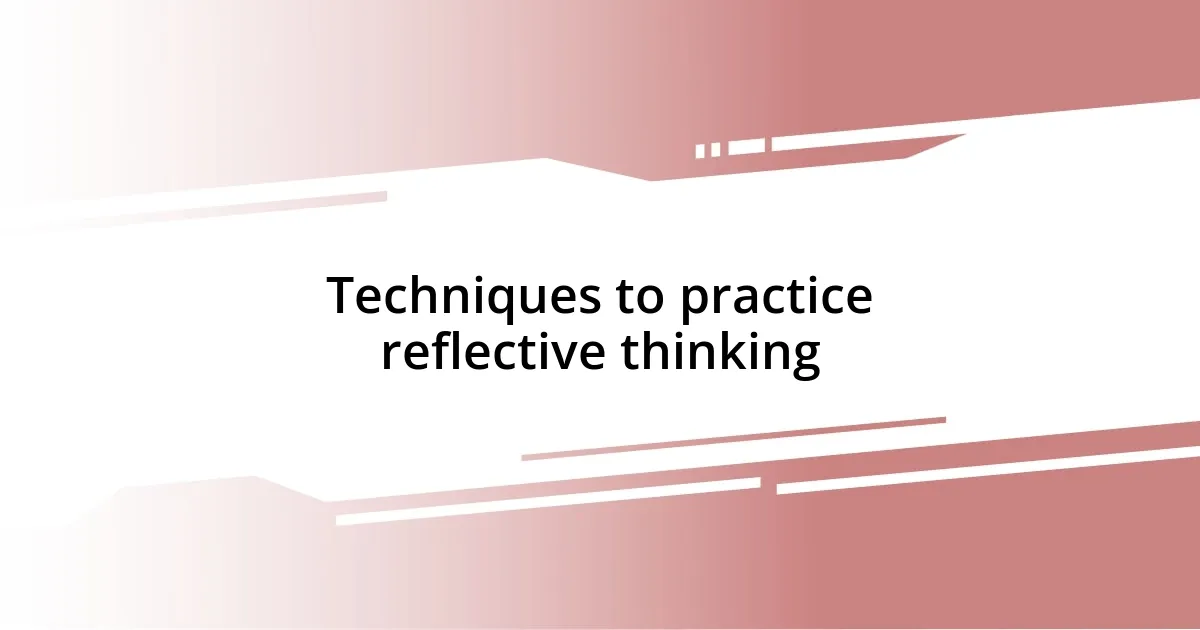
Techniques to practice reflective thinking
There are several techniques I’ve found incredibly effective for practicing reflective thinking. One technique is journaling. After a long day, I often find solace in writing down my thoughts and feelings. Not only does it allow me to process what happened, but it also offers a place for me to uncover recurring themes or emotions that need attention.
Another approach involves engaging in structured conversations with a mentor or trusted colleague. During a recent discussion, I talked through a difficult decision I faced. The dialogue opened my eyes to perspectives I hadn’t considered, enriching my understanding of the situation and myself.
Finally, mindfulness meditation can significantly enhance reflective thinking. By setting aside a few minutes each day to focus on my breath, I cultivate a sense of presence. This practice clears mental clutter, allowing me to confront my thoughts more effectively. Can you recall a time when just stopping and breathing helped you gain clarity? I believe that these techniques not only help in organizing my thoughts but also foster a deeper connection to my personal journey.
| Technique | Description |
|---|---|
| Journaling | A method where I write down my reflections, thoughts, and feelings to process and analyze experiences. |
| Structured Conversations | Engaging with a mentor or colleague to discuss experiences, which can reveal new insights and perspectives. |
| Mindfulness Meditation | A practice that involves focusing on breathing to enhance presence and clarity during reflective thinking. |
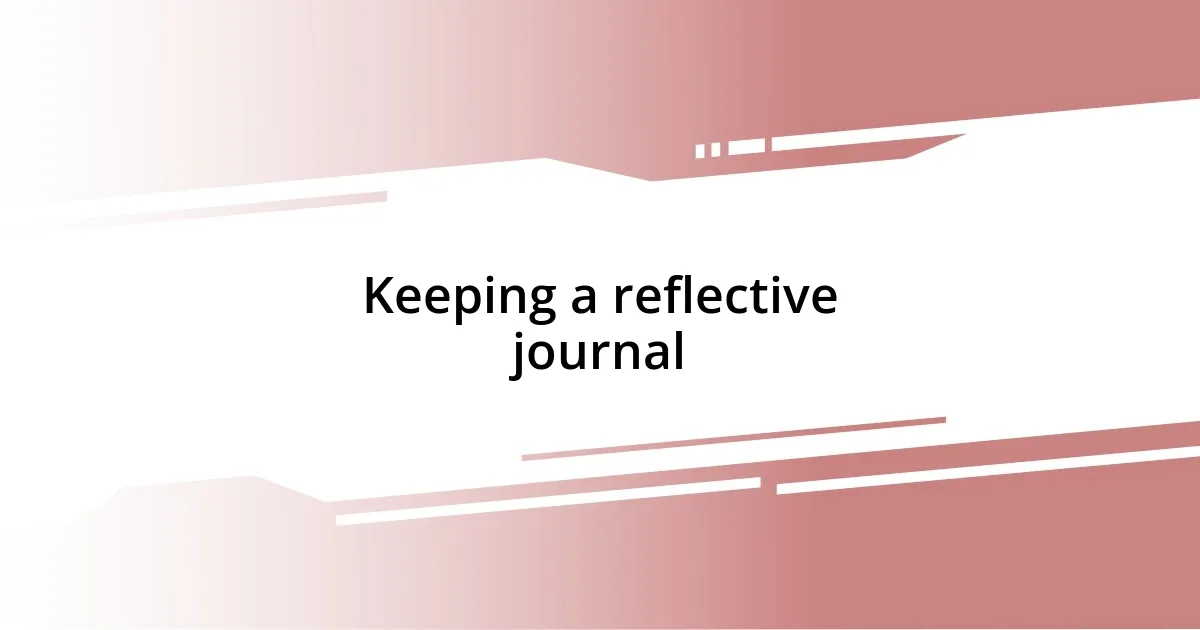
Keeping a reflective journal
Keeping a reflective journal has become an essential part of my daily routine. I remember the first time I poured my heart into a blank page; it felt like unlocking a hidden door to my thoughts. Each entry reveals patterns in my emotions and decisions that I might overlook in the hustle of life. Have you ever noticed how writing down your thoughts can bring clarity? It does for me, highlighting lessons learned and pathways for growth.
The beauty of a reflective journal is in its flexibility. I often doodle or jot down quotes that resonate with how I feel. This creative expression transforms my reflections into something tangible, and on tough days, reading back through old entries reminds me of my progress. I find it fascinating how, just by revisiting my own words, I can relive moments of triumph or even painful times that taught me resilience.
In addition to documenting experiences, I use my journal to set intentions for the future. When I write down my goals, I feel more committed to them. It’s like whispering a promise to myself, anchoring my ambitions in the pages of a journal. Do you think writing can shape your future? I truly believe that reflection, captured in written form, empowers me to actively design the life I want.
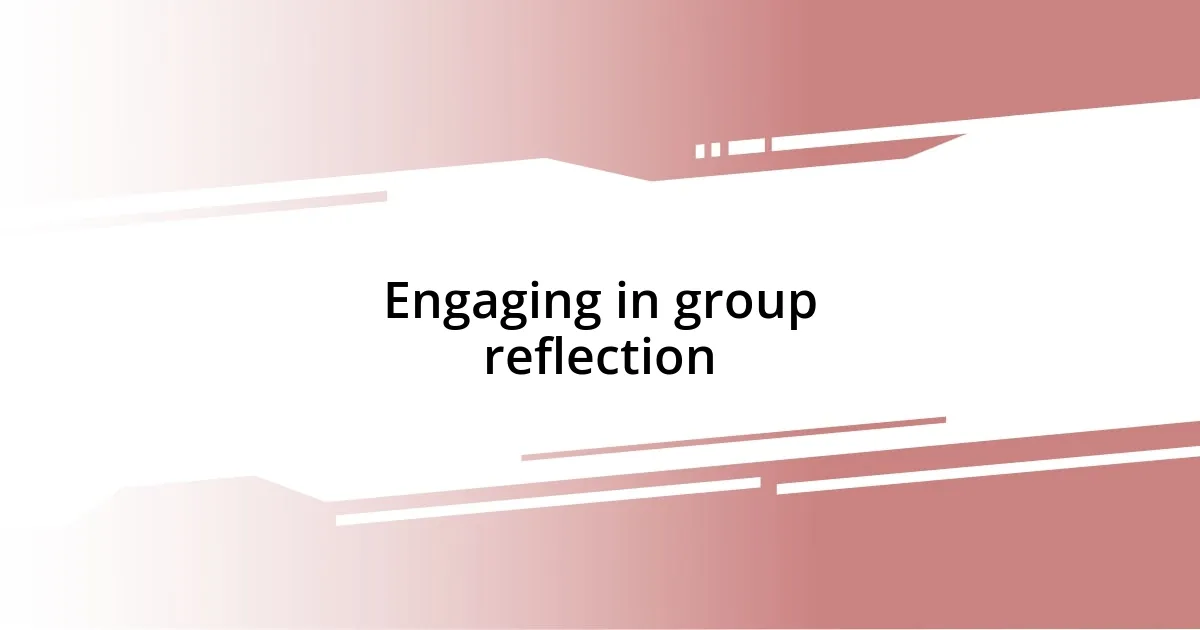
Engaging in group reflection
Engaging in group reflection brings a unique dynamic to the reflective process. I recall a team meeting where we gathered to discuss our recent project outcomes. As we shared our experiences, I found it enlightening how each person’s perspective illuminated aspects I hadn’t considered. It was almost like piecing together a complex puzzle—each voice added a crucial piece that contributed to the bigger picture.
One memorable moment was when a colleague bravely shared their struggle during the project. Their honesty sparked a deeper discussion, allowing us all to connect on a more personal level. I realized that vulnerability fosters trust among team members, and in that safe space, we could explore our individual and collective growth. Have you ever felt that sense of community when sharing experiences? I think it’s a powerful catalyst for deeper insights.
Group reflection doesn’t just enhance our understanding of a situation; it also strengthens relationships within the team. I’ve noticed that the more we reflect together, the more open we become to giving and receiving feedback. It’s not just about processing the past; it’s about building a foundation of support for future endeavors. Isn’t it fascinating how shared reflection can transform a group into a cohesive unit? It’s a practice that has enriched both my personal development and the team’s collaboration.
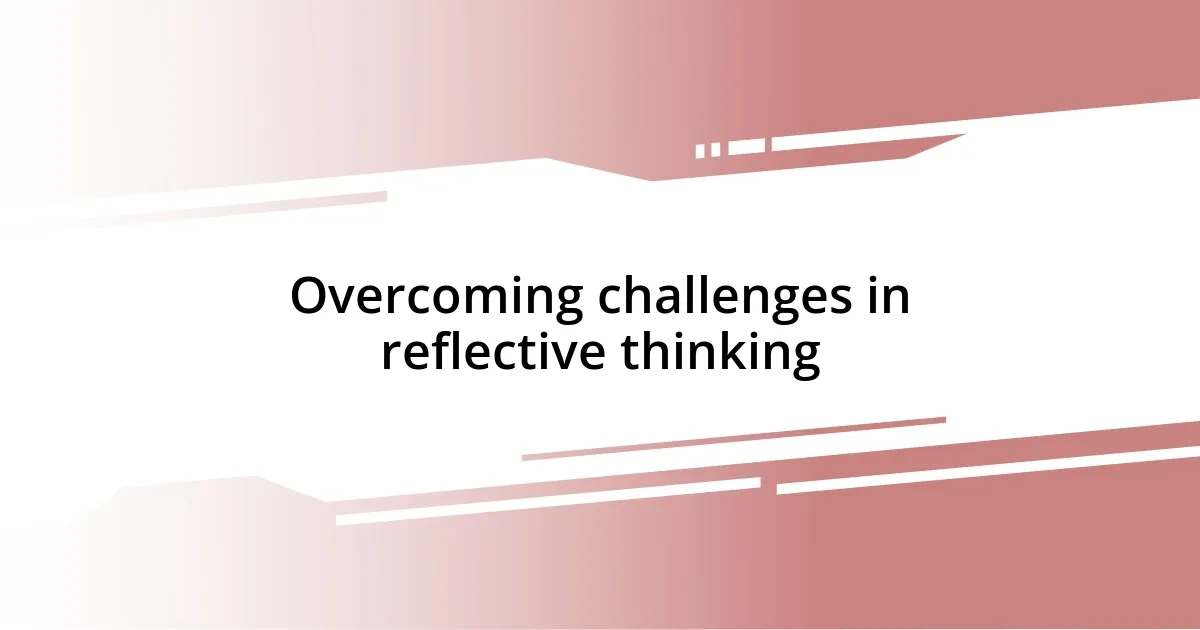
Overcoming challenges in reflective thinking
Reflective thinking often brings challenges, especially when it comes to confronting uncomfortable truths. I remember a time when I reviewed my performance after a project didn’t meet expectations. The initial feelings of frustration and disappointment were overwhelming. Yet, by embracing those emotions and allowing myself to sit with discomfort, I ultimately uncovered valuable insights about my approach. Have you ever faced a similar situation where vulnerability led to growth? It can be tough, but it’s often where the real learning happens.
Another challenge I frequently encounter is staying consistent with my reflective practice. Some weeks, life feels too busy to carve out time for introspection. However, I found that even short, five-minute reflections can be impactful. It’s about quality, not quantity. When I prioritize those moments—whether jotting down a single thought or a quick sketch—I remind myself that reflection doesn’t have to be drawn-out to be effective. Do you ever find it hard to prioritize self-reflection? Small steps can lead to great progress.
Additionally, the fear of judgment, whether from myself or others, can hinder open reflection. I’ve faced this quite a bit, especially when sharing my thoughts in group settings. Initially, I hesitated to voice my reflections, fearing they wouldn’t be well received. But over time, I learned that authenticity resonates more than a polished facade. When I finally gathered the courage to be genuine, I established a deeper connection with my peers, allowing for richer discussions. How have you navigated the fear of sharing your true thoughts? I discovered that opening up not only benefits my personal growth but also encourages others to do the same.












